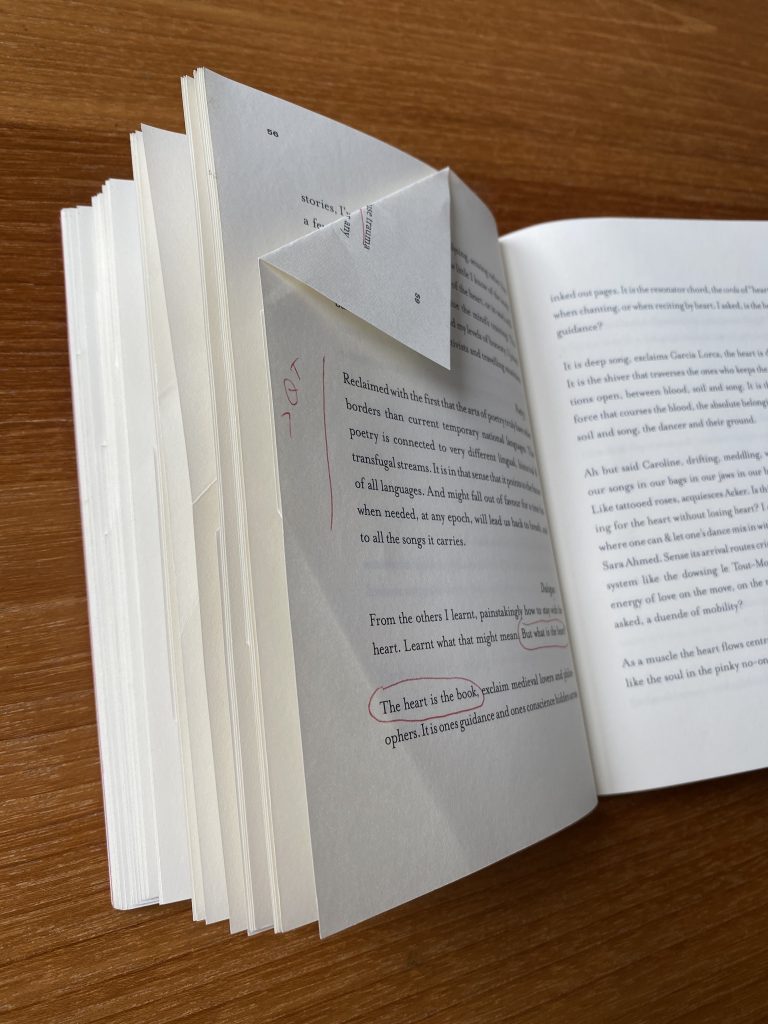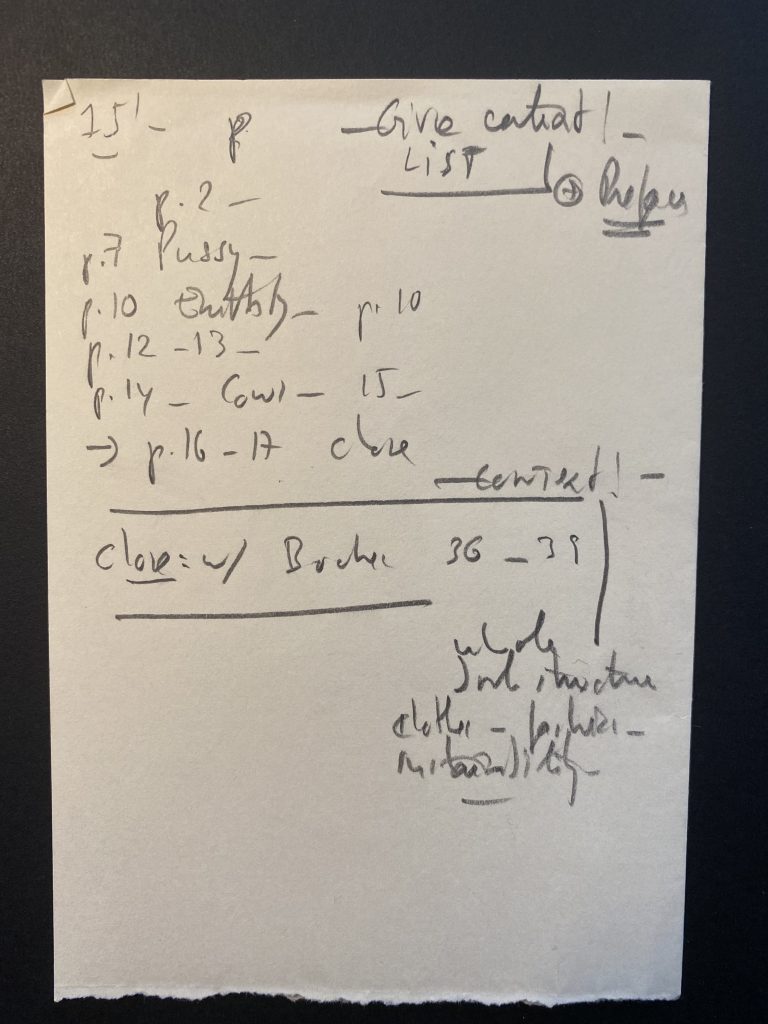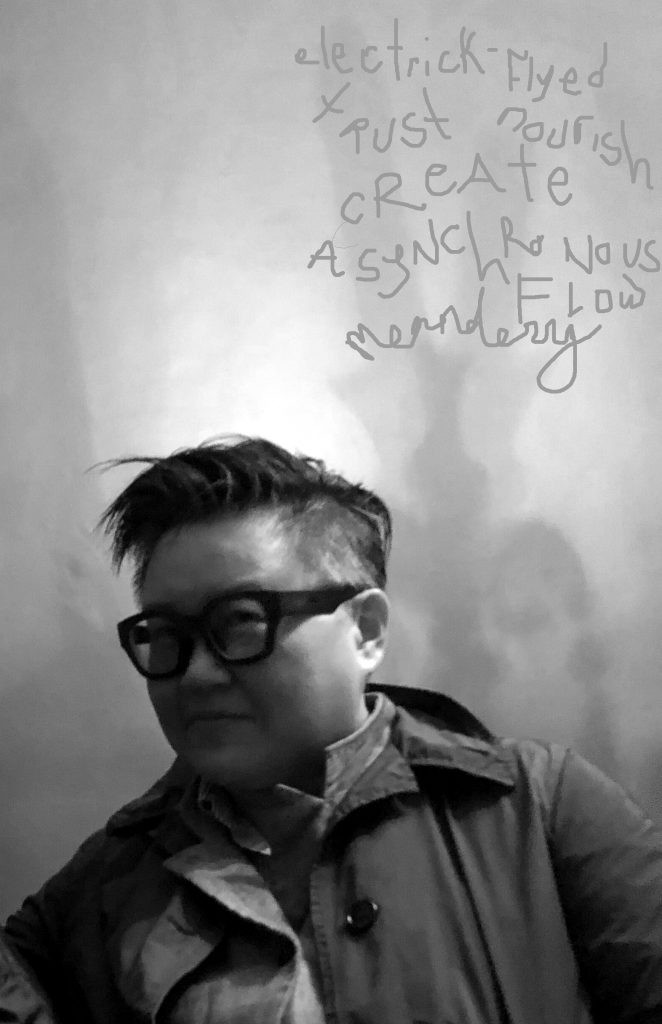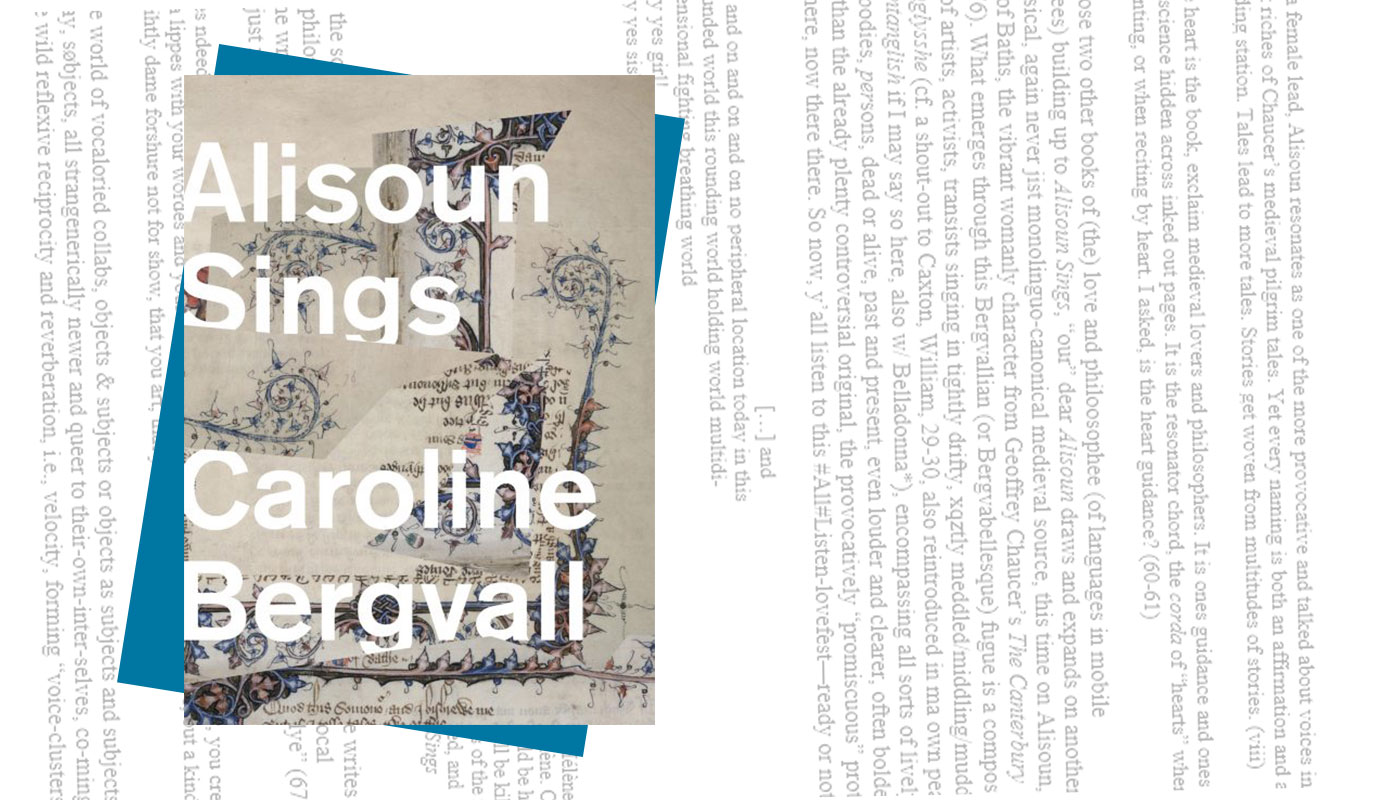Q aka Kyoo Lee
CoReflecting OnWith:
Caroline Bergvall | Alisoun Sings | Nightboat Books | 9781643620015 | November 2019
Reclaimed with the first that the arts of poetry truly have other
borders than current temporary national languages. That
poetry is connected to very different lingual, historical &
transfugal streams. It is in that sense that it points to the future
of all languages. And might fall out of favour for a time but
when needed, at any epoch, will lead us back to breath, and
to all the songs it carries. — Caroline Bergvall, Alisoun Sings
“Create what nourishes trust” (38) one could carry.
In and with language: so you play and pray, virally, vitally, counter-. Say, a word within a world and a world within a word, such an otherwordily day in and with languages: so you play and pray, virally, vitally, counter-. Say, a word within a world and a world within a word, such an otherwordily worldly, tiny-mighty interplay would indeed be interesting inter-essentially (inter esse) if y’all I mean this impossibly necessary “we” could sort of hear the rustles of that silent operative, inter/enter (entre, between), yes rustles, singplural.
Resounding. Re-sounding. Resonance is the name of the game Caroline Bergvall presents in all those language games she plays seriously, and serially, more than totally. This multi-faceted and talented writer, artist and performer working across multiple genres, languages, media and platforms, an acrossinger extraordinaire, has recently completed her trilogy by showing, summarily, how Alisoun Sings (2019), while retrofuturally rebirthing her own molecular Alyson Singes (Belladonna*, 2008, limited edition of 75). This O so “Dame”d (1-5) force of nature Alisoun 2019, pre-seeded by said Alyson 2008, is naturally all-ready a dam“End of the Begin” (119-120). Already all ready, Dame Alisoun/Alyson is, has been and will have been at work while allowing all receptive listeners to work out their own MO in response. Such are the instantly spraling networks of semio-synaptic interplays our Notre Dame Alisoun generates performatively, retrofuturally. U jist read and hear her. Her cross-dialect-ic, alter-native speech act, not some phd-dialecticized spiel, unleashes in full force the voices allready permeating the last two of the series, Drift (2014) and Meddle English (2011), both also from Nightboat.
In her own words:
The beginning of ma voicing. (88)
At the ende of this meandering flow of amazonian magnificence, som electrified som transported give Alisoun a standing O! (199)
As a female lead, Alisoun resonates as one of the more provocative and talked about voices in the vast riches of Chaucer’s medieval pilgrim tales. Yet every naming is both an affirmation and a holding station. Tales lead to more tales. Stories get woven from multitudes of stories. (viii)
The heart is the book, exclaim medieval lovers and philosophers. It is ones guidance and ones conscience hidden across inked out pages. It is the resonator chord, the corda of “hearts” when chanting, or when reciting by heart. I asked, is the heart guidance? (60-61)
As with those two other books of (the) love and philoosophee (of languages in mobile philopoetrees) building up to Alisoun Sings, “our” dear Alisoun draws and expands on another richly classical, again never jist monolinguo-canonical medieval source, this time on Alisoun, The Wife of Bath, the vibrant womanly character from Geoffrey Chaucer’s The Canterbury Tales (1476). What emerges through this Bergvallian (or Bergvabellesque) fugue is a composite character of artists, activists, transists singing in tightly drifty, xqztly meddled/middling/muddled Comyn Englysshe (cf. a shout-out to Caxton, William, 29-30, also reintroduced in ma own peace Writing Entanglish if I may say so here, also w/ Belladonna*), encompassing all sorts of lively sounding bodies, persons, dead or alive, past and present, even louder and clearer, often bolder and ruder than the already plenty controversial original, the provocatively “promiscuous” proto-feminist there, now there there. So now, y’all listen to this #All#Listen-lovefest—ready or not.
[…] and
on and on and on and on no peripheral location today in this
rounded world this rounding world holding world multidi-
mensional fighting breathing world
Say yes girl!
Say yes sisbro! (105-106)
As our another sishe, say, Hélène, says:
Well I had a body yet I was with the dead, quod Hélène. ON
POUVAIT ME FAIRE MAL À LA LETTRE I could be hurt
down to the letter, writ Cixous. You wont kill you’ll be killed.
You wont write you wont touch, those are the laws of the for-
eigner. I had no roots no legit language yet I adored, and
adoring came I to. (39)


On “to all the songs it carries” (60): as Alisoun in this indestructible mode of self-care writes down her philopoetic letters of polyversal loving care, in her strlanguage of middle-vocal alterity, she writes a letter to them with which/whom she collaborates, heartily, “xactlye” (67) even, not just xqztly as I sayd above and as you yourself can see below:
Too right! exclaims Alisoun. We’ve kept seprate fronts for too
long, seprate ponds seprate beds seprate ways ’n battles of
kinds, together nat by kin nat by kind, all kings a drag anyhow,
ignorance nis bliss. Operatively takes time takes aspiration,
sending love out nis simpel matter, naming kept me stumm
until I stepped off, until I let the heart speak for me with me,
feeling the current rise as I do and the light of intention come
warm and crisp. One by one I peel the layers & give thanks.
Ne fetish love! Ne totemic love! (97)
Right! In the world of vocaloried collabs, objects & subjects or objects as subjects and subjects as objects, say, søbjects, all strangenerically newer and queer to their-own-inter-selves, co-mingle with some wild reflexive reciprocity & reverberation, velocity, forming “voice-clusters”:
Voices call up other voices. A voice is a voice-cluster. I sense her coming through as a concert of sounds and lives and purposes from a vast patchwork of influences, events, and emotions that accord with her, and revitalise her presence among us. Her persona, her phrasing, her intentions, her clothes, her geographies, emerge, available, recyclable and drawn out from the infinite details and impulses of a great range of […] (viii)
… “constellations, a field” (15). And so arises the question: “Wat if I present as a crowd, a school of beings deep and elemental, wisdom aroused […]” (15); the rest seems too arousing.
(1) Words collect emotional and physical responses.
[…]
(5) When you reach down for the sound, it is touched off like a drum; it releases itself and reaches as far as you wish. The sound is there to back the word. — M. NourbeSe Philip, She Tries Her Tongue, Her Silence Softly Breaks
When the poet I’llisten to whom I will listen goes on to shout, with such poetic economy, to the crowd that is and crowns all selves in maself and herself that “we can flap large as pelicans” (15) with such poetic economy, we get to sense how and where the task of the poet as a lead-singer “right caress”-er (15) could possibly materialize: this inventive connective recycling, almost endangered surviving now, literally and metaphorically, must take place, more or less, for less can be more, and we can do more with less, as we learn from the world and planters of poetrees.
Against some transhating antitranslators among us, to some monologocenterritorius often lost in, cornered into, their living rooms, perhaps what one could still transmit are some cans of can-can?
Again, she comes in, to us, with us, “through as a concert of sounds and […]” (viii, my stress), so keep your windows open, folks, cold out there, let the whirwindy words of our, ur Alisounation too come through, for languid she is not, and yes, you, too, are in this together.
What?
Again, Alisoun Who?
Whatthe, whoz, nwhyonearth xactlye?
Yup, you heard her right, there she springs forth again—with you.
won’t you celebrate with me
what i have shaped into
a kind of life? i had no model.
— Lucille Clifton, “won’t you celebrate with me”


Kyoo Lee, Professor of Philosophy and Gender Studies at CUNY and the author of Reading Descartes Otherwise: Blind, Mad, Dreamy, and Bad (FUP) along with a forthcoming book on visual philopoetics (The MIT Press), also a member of AICA-USA and the Editorial Manager for the Korean Pavilion at 59th Venice Biennale 2022, is a “thought-curator” on the go: a philosopher-writer and critic who blends critical theory and creative prose through curatorial attention to details which often entail site-specific and collaborative ruminations.
A transdisciplinary, translingual and transcontinental scholar whose innovative work has been supported by faculty fellowships and visiting appointments from Cambridge University, CUNY Graduate Center, KIAS, the Mellon Foundation, the NEH, Seoul National University and Yanbian University among others, her art-integrated philopoetic texts have appeared in AICA-USA Magazine, Asian American Literary Review, The Brooklyn Rail, Flash Art, Meiji Review, PN Review, Randian, The Volta and The White Review as well as various academic venues.
An avid reader, currently she serves as the co-editor of philoSOPHIA: A Journal of transContinental Feminism and is also on the boards of Asian Journal of Women’s Studies, Belladonna*, Bloomsbury Studies in Critical Poetics, Derrida Today, Litmus Press, Open Humanities Press, Simon de Beauvoir Studies and Women’s Studies Quarterly. Most recently, she published Queenzenglish.mp3: poetry | philosophy | performativity (2021), a Mellon-funded anthology with contributions from 50+ poets, artists and theorists from across the globe, and currently she is working on a sequel.

Caroline Bergvall is an award-winning poet, artist and performer. Of French-Norwegian background based in London. She works across languages, art forms and media. A strong exponent of interdisciplinary arts practices and the development of writing methods adapted to contemporary modes, as well as multilingual identities and histories. Her poetic work is widely featured and translated. Her performances and installations are shown and commissioned internationally by museums, festivals and galleries like Tate Modern (London), Pompidou Centre (Paris), Callicoon (NY), Khoj Art Centre (New Delhi), Fondacio Tapiès (Barcelona), Poetry Project (NY), Berlin Poetry Festival, Rivers Institute for Contemporary Art (New Orleans) ao. Books include Alisoun Sings (2019) Drift (2014) and Meddle English (2011). Forthcoming collections: Caroline Bergvall’s Medievalist Poetics co-edited with Josh Davies (Winter 2022), Writing at the Crossroads: Essays 1996 – 2016 (Spring 2023). She has recently launched the online “Solitary to Solidary Arts Lab” for exchanges and training in collaborative and expanded writing pratices. Various academic appointments of which Director of Performance Writing, Dartington College of Arts (1994-2000); Collaborative Arts Fellow (Chicago University/Art Institute). Currently Visiting Professor Kings College London (2017-) and a Kelly Writers House Fellow, UPenn (2022).
